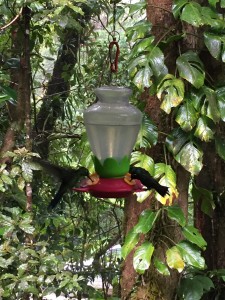The most common source of food for hummingbirds is nectar. Hummingbirds prefer nectar with high sugar content, and they will only seek out nectar that is more than 10% sugar. Due to their high metabolism, hummingbirds must consume a large amount of food in comparison to their body weight. Some hummingbirds will consume twice their body weight in nectar per day. Food is very important to these animals since they must consume so much. Hummingbirds often become territorial around flowers that give them a good source of nectar, and they are even willing to fight with one another over flowers. Hummingbirds will also fight off others at artificial feeders filled with nectar.
Some hummingbirds are considered to be “nectar thieves.” Hummingbirds with short or sharp beaks can penetrate the base of a flower and easily obtain nectar. This hurts the flowers because the goal of pollination is not obtained if the hummingbirds do not go near the stamens of the flower.

Hummingbirds at an artificial feeder in Monteverde
Nectar is not enough to sustain the birds nutritionally. Hummingbirds must also eat insects and spiders since nectar is simply sucrose, glucose, and fructose. Hummingbirds will pluck helpless insects off webs or simply eat insects off of the ground.
Artificial feeders are a controversial topic among hummingbird researchers. The feeders provide hummingbirds with a steady source of food even when flowers may not be blooming in large quantities. Hummingbirds flock to the feeders, which in turn gives humans an easy way to watch and observe the birds. However, the artificial feeders can lead to inhibition of pollination. About 10% of flowers are designed to be pollinated by hummingbirds, so a lack of visitation from the birds can be very problematic. Artificial feeders also create an abnormally large population in the surrounding area. The large population can lead to increased disease exposure between different species of hummingbirds.

